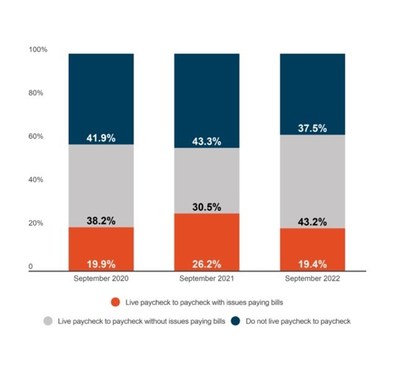Wages Have Failed to Match Inflation, 65% of Employed Consumers are Living Paycheck to Paycheck
LendingClub Corporation (NYSE: LC) has released the 15th edition of its Reality Check report, revealing significant financial strains among U.S. consumers. As of September 2022, 65% of employed consumers are living paycheck to paycheck, marking a 5% rise from the previous year. While average hourly earnings increased by 4.9%, inflation surged by over 8.2%. The findings indicate widespread economic concern, with 64% of consumers fearing current and near-future conditions.
- The report provides critical insights into consumer financial behavior amidst economic challenges.
- Highlighting the importance of job stability, those employed for over five years show higher savings and credit scores.
- Wage growth is insufficient to keep pace with inflation, leading to increased financial stress.
- A high percentage of consumers, including 63% of mid to high-income earners, are living paycheck to paycheck.
- Only 14% of workers have seen income growth that matches or exceeds inflation, with many feeling job dissatisfaction.
Over the past 12 months, wages have increased by
SAN FRANCISCO, Oct. 24, 2022 /PRNewswire/ -- LendingClub Corporation (NYSE: LC), the parent company of LendingClub Bank, America's leading digital marketplace bank, today released findings from the 15th edition of the Reality Check: Paycheck-To-Paycheck research series, conducted in partnership with PYMNTS.com. The Employment Edition provides an overview of consumers' employment characteristics, changes and expectations and how they affect their financial lifestyles.
Today's Paycheck-To-Paycheck Landscape
As inflation continues to outpace wages, the share of consumers living paycheck to paycheck nears a historic high. Sixty-three percent of consumers were living paycheck to paycheck as of September 2022, compared to
Living Paycheck to Paycheck as an Employee
Sixty-five percent of employed consumers were living paycheck to paycheck in September 2022 —a 5 percentage point rise from a year ago. Among those of working age, consumers who live paycheck to paycheck comfortably are the most likely to be employed. In fact, inactive workers make up a significant share of those who do not live paycheck to paycheck.
"The five-percentage point increase in employed consumers living paycheck-to-paycheck from last year is an indication of how consumers are not able to keep up with the pace that inflation is increasing," says Anuj Nayar, LendingClub's Financial Health Officer. "Being employed is no longer enough for the everyday American. Wage growth has been inadequate, leaving more consumers than ever with little to nothing left over after managing monthly expenses."
Financially struggling consumers are disproportionally concentrated in the retail and services segments. Twenty-six percent of financially struggling consumers have more than one employer. Less than four in 10 consumers think their current jobs meet their wage expectations. Even high-income consumers are likely to say their current jobs do not meet their salary expectations.
Dissatisfaction about wage expectations is a strong differentiator in willingness to switch. Three in 10 workers are likely to change their jobs over the next six months. Those financially struggling evidence the highest turnover rates, with four in 10 not very or not extremely likely to be at their current jobs six months from now.
However, while many consumers have switched jobs to upscale their paychecks in the past, the report shows optimism about finding a new job that fits both wage demands and an employee's qualifications is generally low. Regardless of demographic, only
The report also shows the benefits of staying with a job for a longer period, consumers with more than five years in their current position are
Inflation v. Wages
Despite the low unemployment rates, average hourly earnings have failed to match the rate of inflation, increasing by
Regardless of a consumer's financial lifestyle, households are highly likely to have multiple sources of income and are currently vulnerable to swings in labor market conditions. While
Even as the Federal Reserve doubles down on efforts to combat rising prices, consumers believe it will take until mid-2024 to tame inflation. Sixty-two percent of all consumers believe a recession will come in under a year and
"With inflationary pressures not expected to subside anytime soon, living paycheck to paycheck has become the norm." Nayar added, "Many are pessimistic about their odds of increasing their paycheck by switching jobs and some households will become more vulnerable to swings in labor market conditions. This could cause many to struggle with the upcoming Holiday season."
To view the full report, visit: https://www.pymnts.com/study/reality-check-paycheck-to-paycheck-income-budget-inflation-employment/
Methodology
New Reality Check: The Paycheck-To-Paycheck Report — The Employment Edition is based on a census-balanced survey of 3,942 U.S. consumers that was conducted from Sept. 9 to Sept. 23 as well as analysis of other economic data. The Paycheck-To-Paycheck series expands on existing data published by government agencies such as the Federal Reserve System and the Bureau of Labor Statistics to provide a deep look into the elements that lie at the backbone of the American consumer's financial wellness: income, savings, debt and spending choices. Our sample was balanced to match the U.S. adult population in a set of key demographic variables:
About LendingClub
LendingClub Corporation (NYSE: LC) is the parent company of LendingClub Bank, National Association, Member FDIC. LendingClub Bank is the leading digital marketplace bank in the U.S., where members can access a broad range of financial products and services designed to help them pay less when borrowing and earn more when saving. Based on more than 150 billion cells of data and over
CONTACT:
For Investors: IR@lendingclub.com
Media Contact: Press@lendingclub.com
PYMNTS Contact: information@PYMNTS.com
![]() View original content to download multimedia:https://www.prnewswire.com/news-releases/wages-have-failed-to-match-inflation-65-of-employed-consumers-are-living-paycheck-to-paycheck-301655832.html
View original content to download multimedia:https://www.prnewswire.com/news-releases/wages-have-failed-to-match-inflation-65-of-employed-consumers-are-living-paycheck-to-paycheck-301655832.html
SOURCE LendingClub Corporation
FAQ
What are the key findings of the LendingClub Corporation report released on October 24, 2022?
How has inflation affected consumers, according to LendingClub's latest report?
Which demographic is most affected by current economic conditions as per the LendingClub report?
What does LendingClub's report say about job stability and financial health?









